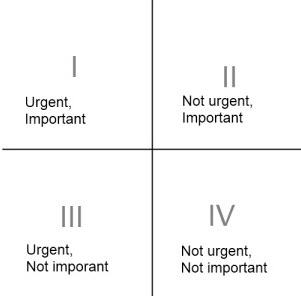Advices related to time management are dime a dozen. Visit a book store or google for productivity/time management and whoa! we have a million resources. But, few theories make a lot of sense, especially for our times. ‘Getting things done’ and ‘First things first’ are two such theories (propounded by David Allen and Stephen Covey respectively) for me. At first reading, these concepts seem to be at odds with each others, but as you dig in we can see a lot of value. I personally feel by mixing these two concepts I could unlock great value.
If one book (GTD) put focus on ‘ground up’ approach to time management, the other (First Things First) focused on ‘top down’ approach. What are these ‘ground up’ and ‘top down’ approaches? In ‘Ground up’ approach we make a note of, and handle all that is pending, focus on all needs to be done as of now – from watering the garden to report at work, from sending flowers to your mother to thinking about her retirement care. And, as we complete all the pending tasks, we’ll free up time to think and act on strategic/meaningful aspects of our life. Whereas in the ‘Top down’ approach we identify & block time for the most important objectives of our life and then schedule/organize any and all other activities around these big rocks. Let’s see these principles in detail as explained by the authors.
First things First: In this book Stephen Covey first distinguishes why there’s a need for us to shift focus from what he calls ‘clock’ to ‘compass’. The ‘clock’ way is when we spend time on our day to day chores and handle things as they come. The ‘compass’ way is when we first spend time on our values – on what we see as important in life, and then work on the rest. Unfortunately, he says, we are more guided by the clock than our compass and that we should strive towards understanding our values. In short, we should identify what is ‘important’ work in our life. Then, he further illustrates his point by bifurcating all the work we do into four quadrants – based on – ‘importance’ and ‘urgency’.

Since we are all driven by the clock, we focus on urgent matters and not bother about work which is not critical at the present juncture. That is, focus is on non important work – quadrants 1 & 3 than on important work – quadrant 2. Out of mere habit we neglect the ‘important’ stuff until it becomes ‘urgent’. Ex: Instead of spending time with our mother who is in retirement home, we tend to work on the yet another urgent report at work, sacrificing a relationship in the process. So, he suggests, we all get our act together, note down what is truly important in our life, who are important to us in our life in a personal mission statement, identify quadrant 2 goals in them and block time (on a weekly basis) to achieve them.
GTD: Getting things done, on the other hand, focuses on a few key concepts – capturing all unfinished work in some place other than our brain, clarifying what needs to be done to move them to closure – the next actions, and dividing them on contexts. David goes to say that we cannot focus on the ‘important’ activities of life if we have other pressing issues at hand. So, he advises all to get all the pending work done, before we concentrate on the activities which matter to us, ’cause he says, we would not be able to think about our mother if our mind is preoccupied with a deadline looming at work. So, first, he says, capture everything out in an inbox (paper or digital), clarify what exactly needs to be done to move that work forward (if planning kid’s birthday is the task – preparing invitees list is a next action), bifurcate those next actions based on contexts (items that are needed to complete a task, or place you need to be in to do so), and focus only on what you can get done in the context you are-in, in any given moment. This way, we’ll be able to make the best use of the present and complete all pending tasks freeing up time to focus on important & strategic objectives of our life.
Mixture: Though there are other aspects to both the theories, these two concepts of – blocking time for what we value in life from ‘first things first’ & working on tasks based on ‘contexts’ from ‘getting things done’ are the key take aways for me. So, what’s the best way? To use GTD to handle all the maintenance activites of your life and use the concept of ‘personal mission statement’ from ‘first things first’ to identify what we want in life across the four prominent aspects of our life – physical, mental, spiritual & social and identify critical goals (quadrant 2) related to them and again use the ‘GTD’ to break down those goals to doable practical physical next actions, bifurcate according to contexts and incorporate them in our weekly schedule to get them done. Then, spend some time every week to move these ‘important’ projects forward. Another side benefit of working based on contexts (GTD) is that we are fully present while handling that task (’cause after all, if we are at work, there’s no point in thinking about fixing the plumbing at home isn’t it?). This is nothing but mindfulness. Thus, by mixing both these concepts, we can not only get things done, but also get the right things done. And, be mindful at the sametime.

Very nice comparison, just one query, whether you have prepared any template or workflow to implement these two techniques together.
If so please advice me on captkirtiverma@gmail.com
Hi Kirti,
Thanks for reading. No, I do not have any template. However, if you’ve read both the books, merge the concepts of ‘mission statement’ and ‘gtd’. Identify what you want to do in life (in all it’s different roles), break them down into actionable steps and incorporate them into your schedule. The challenge will be to manage your day to day life and your dreams.
I wrote a continuation post to this called ‘living forward’, you may want to refer it.
Sai